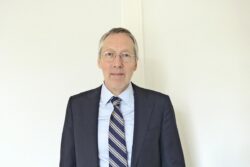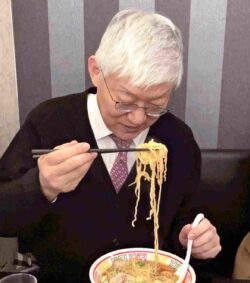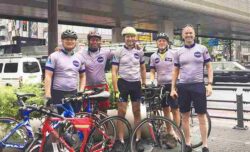ACCJ president Jenifer Rogers promotes women’s advancement in the Japanese business world
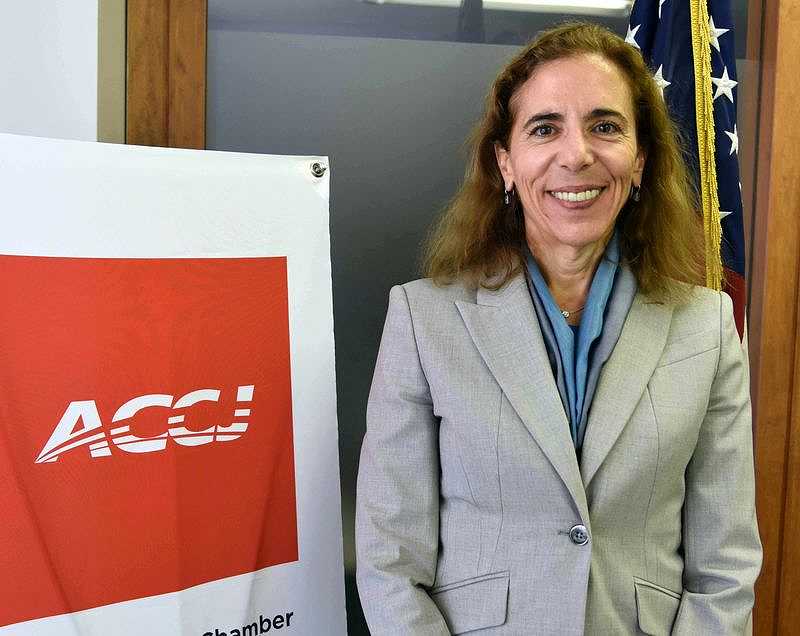
ACCJ president Jenifer Rogers
12:56 JST, August 15, 2021
The first five faces in the leadership section of the American Chamber of Commerce in Japan website are women. “This is our most diverse leadership ever,” said ACCJ President Jenifer Rogers. The chair, the treasurer and three out of seven vice presidents are women. In the Japanese business world, where leadership positions are still largely dominated by men, it is rare to see so many women together in the top ranks.
Rogers took office as president early this year. When the new team was making its rounds of courtesy visits to Japanese business leaders, who are mostly men, she felt her team itself was sending a message. “I love this model, to be the change you want to see in the world,” she said.
Rogers’ focus on the issue of women in the Japanese workplace dates back to 1988, when she conducted research as a Fulbright scholar at the University of Tokyo on the impact of the Equal Employment Opportunity Law which was implemented in 1986.
The law was aimed at redressing the gender gap in the Japanese workforce. What she saw, however, was another gap — between expectations and reality. With little structural change and long working hours, many women were still leaving their jobs after marriage. “You couldn’t have a family and work very easily,” she observed.
In 2014, when her career brought her to live in Tokyo for the fourth time, she was excited to see that substantial changes were starting to happen. Under economic and demographic pressure, the Japanese business establishment was “waking up to make use of the underutilized, well-educated pool of talented women … to remain competitive globally,” she said.
Rogers first came to Tokyo with her parents in January 1981 at the age of 17. She graduated early from high school in Michigan to accompany her father, who was posted to Tokyo to be the president of Dow Chemical Japan Ltd. She had been to Europe by then, but it was her first exposure to Asia.
“Japan was so exotic and different. No Roman letters, the language was different, the food, the people, it was just such an exciting but disorienting experience,” Rogers recalled. Tokyo at the time was much harder to get around without knowing Japanese, so she was “very motivated” to learn the language.
From April that year, she entered Sophia University’s comparative cultures program, which offered courses in English with credit transferable to U.S. universities. At the same time, she took intensive Japanese classes and joined the university’s gymnastics team as its only foreign member. She immersed herself in Japanese student life and even did a homestay with a family of rice farmers in Hokkaido.
“What really was valuable for me was the fact that it forced me to look at my Americanness. When you grew up with one culture, you just assume that that is the right way to do things. And when you come to a place like Japan, the rules are all different. To me, that was kind of liberating. It made me self-reflect at a very young age on cultural and national identity,” she said.
For example, unlike her gymnastics training in the United States, where team members each did their own routines while individually consulting with the coach, in Japan, members warmed up together and then performed routines one by one while others watched, cheered and critiqued.
“The individual freedom I had to decide my workout schedule was taken away … While that was frustrating to me, the kind of camaraderie that you build is very different,” she said.
“You lose a little bit of autonomy, but you learn a lot of patience. I believe and hope I am a much more patient person now.”
She returned to the United States after two years. “I think that that exposure to Japan, and some investment in the language at a young age, really gave me a very unique skill set that opened a lot of doors that I don’t think would have been opened otherwise,” Rogers said.
She is now fluent in Japanese. She serves as an external director on boards of three listed Japanese companies, participating in some board meetings held entirely in Japanese after reading board-related documents without English translations.
“Language is contextual. You learn about the history, the social context, the origin. What I’ve hoped that I’ve become over time is not only bilingual but bicultural,” she said.
Rogers’ days are usually packed with meetings. In addition to her corporate roles, she is also involved in various cultural and educational organizations in Japan and the United States, and she still fits in daily workouts and weekly Chinese lessons.
With multiple responsibilities, “It can be challenging,” she admits. “But I try to compartmentalize and prioritize. Because I enjoy everything I do, what I really try to do is, look at the week, then kind of plan out when my deliverables are. And then, just really make sure that, as I prepare for each and take them on, I don’t worry about anything else. I just try to focus and live in the moment.”
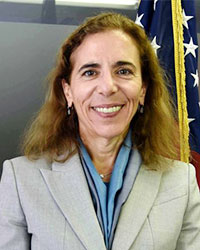
Jenifer Rogers
President of the American Chamber of Commerce in Japan (ACCJ)
Originally from Midland, Michigan, Rogers has lived in Japan for more than 16 of the past 40 years in four different occasions. Since 2014, she has been based in Tokyo as general counsel of Asia for Asurion Japan Holdings G.K. She is an external director on the boards of Mitsui & Co., Kawasaki Heavy Industries and Nissan Motor Co. She also holds board positions with not-for-profit entities such as Fulbright Japan and the U.S.-Japan Council (Japan), and she is a founding member of the Japan Center of the Asia Society. Rogers holds degrees from Georgetown University and Johns Hopkins University and is a member of the New York bar. Her favorite Japanese food from her student days is okonomiyaki savory pancakes. She loves to travel and has visited 57 countries and regions, with her most memorable trips including Laos and Patagonia.
Top Articles in JN Specialities
-
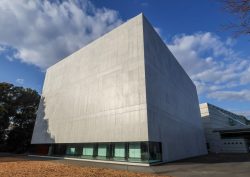
Tokyo University of the Arts Now Offering Free Guided Tour of New Storage Building, Completed in 2024
-
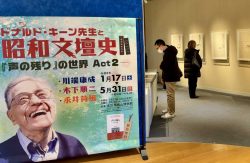
Exhibition Shows Keene’s Interactions with Showa-Era Writers in Tokyo, Features Newspaper Columns, Related Materials
-

The Japan News / Weekly Edition (1/30-2/5)
-

Step Back in Time at Historical Estate Renovated into a Commercial Complex in Tokyo
-
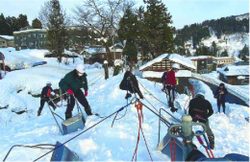
Prevent Accidents When Removing Snow from Roofs; Always Use Proper Gear and Follow Safety Precautions
JN ACCESS RANKING
-

Japan PM Takaichi’s Cabinet Resigns en Masse
-

Japan Institute to Use Domestic Commercial Optical Lattice Clock to Set Japan Standard Time
-

Israeli Ambassador to Japan Speaks about Japan’s Role in the Reconstruction of Gaza
-

Man Infected with Measles Reportedly Dined at Restaurant in Tokyo Station
-

Videos Plagiarized, Reposted with False Subtitles Claiming ‘Ryukyu Belongs to China’; Anti-China False Information Also Posted in Japan


